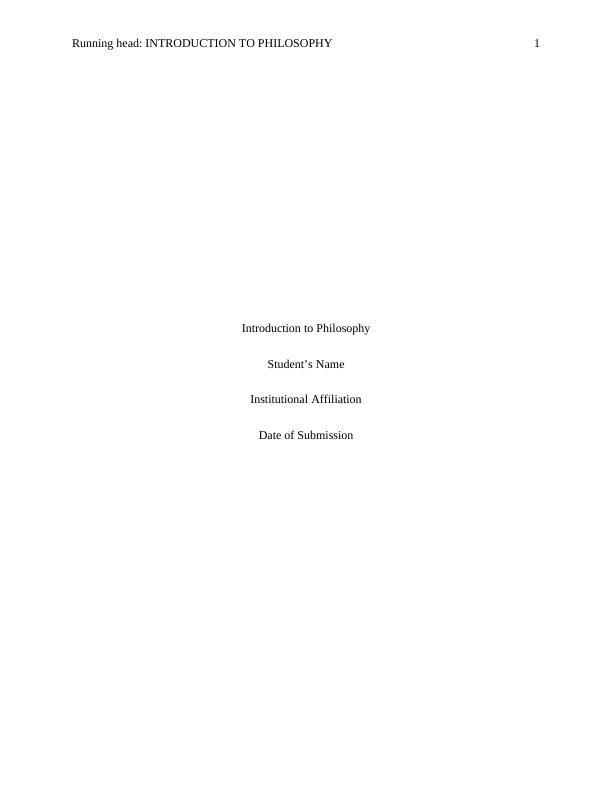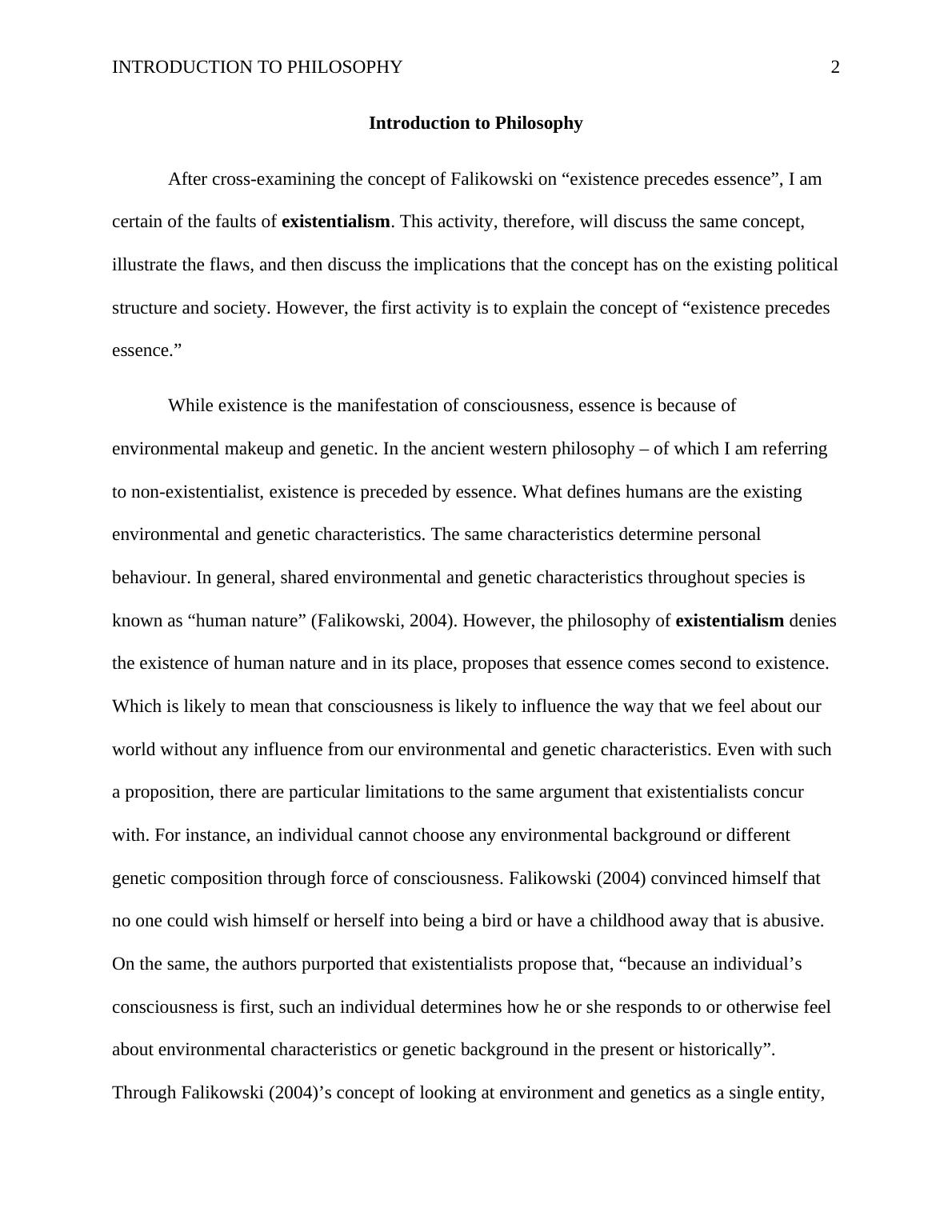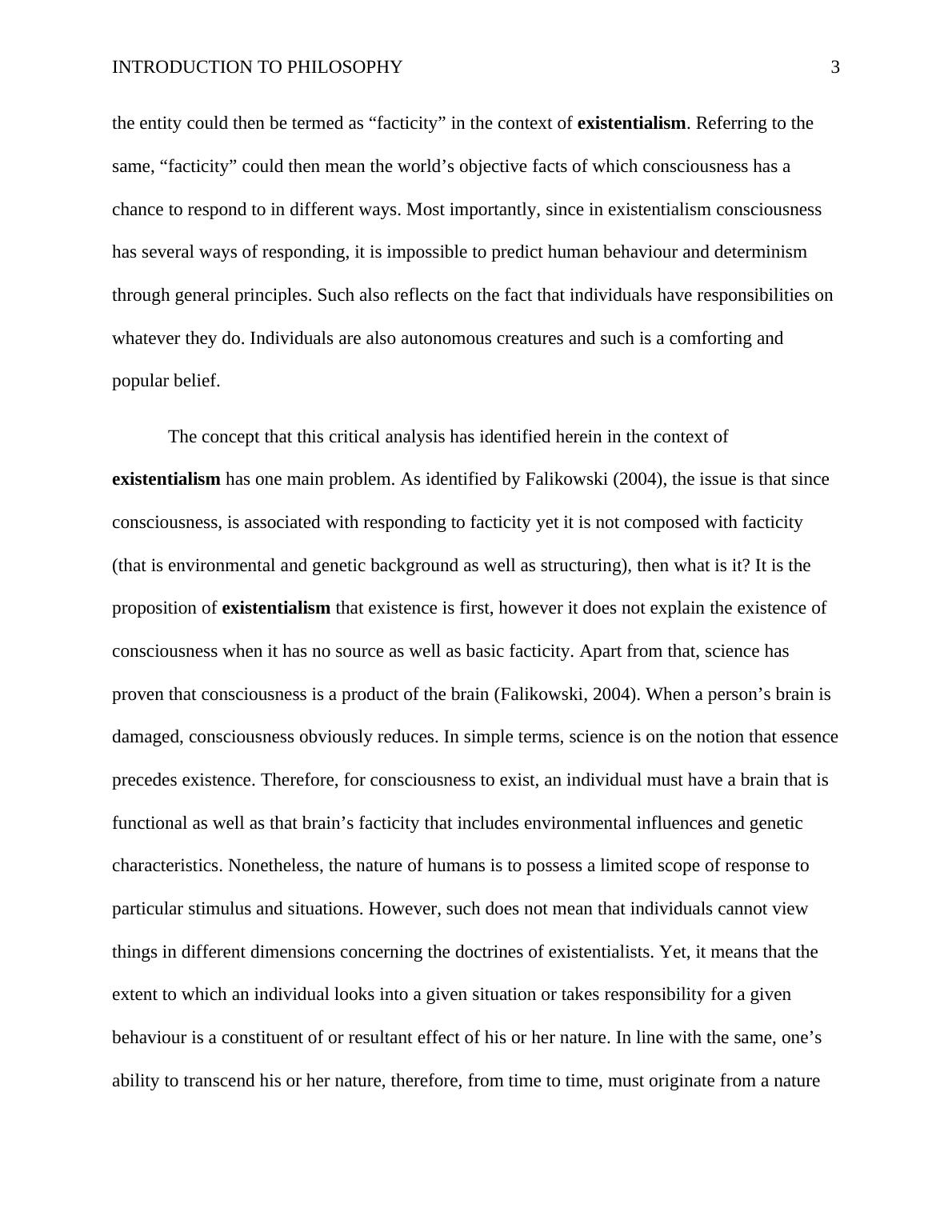Ask a question from expert
PHIL 1000. Introductory Philosophy
6 Pages1464 Words96 Views
Introductory Philosophy (PHIL 1000)
Added on 2021-10-05
PHIL 1000. Introductory Philosophy
Introductory Philosophy (PHIL 1000)
Added on 2021-10-05
BookmarkShareRelated Documents
Running head: INTRODUCTION TO PHILOSOPHY 1
Introduction to Philosophy
Student’s Name
Institutional Affiliation
Date of Submission
Introduction to Philosophy
Student’s Name
Institutional Affiliation
Date of Submission

INTRODUCTION TO PHILOSOPHY 2
Introduction to Philosophy
After cross-examining the concept of Falikowski on “existence precedes essence”, I am
certain of the faults of existentialism. This activity, therefore, will discuss the same concept,
illustrate the flaws, and then discuss the implications that the concept has on the existing political
structure and society. However, the first activity is to explain the concept of “existence precedes
essence.”
While existence is the manifestation of consciousness, essence is because of
environmental makeup and genetic. In the ancient western philosophy – of which I am referring
to non-existentialist, existence is preceded by essence. What defines humans are the existing
environmental and genetic characteristics. The same characteristics determine personal
behaviour. In general, shared environmental and genetic characteristics throughout species is
known as “human nature” (Falikowski, 2004). However, the philosophy of existentialism denies
the existence of human nature and in its place, proposes that essence comes second to existence.
Which is likely to mean that consciousness is likely to influence the way that we feel about our
world without any influence from our environmental and genetic characteristics. Even with such
a proposition, there are particular limitations to the same argument that existentialists concur
with. For instance, an individual cannot choose any environmental background or different
genetic composition through force of consciousness. Falikowski (2004) convinced himself that
no one could wish himself or herself into being a bird or have a childhood away that is abusive.
On the same, the authors purported that existentialists propose that, “because an individual’s
consciousness is first, such an individual determines how he or she responds to or otherwise feel
about environmental characteristics or genetic background in the present or historically”.
Through Falikowski (2004)’s concept of looking at environment and genetics as a single entity,
Introduction to Philosophy
After cross-examining the concept of Falikowski on “existence precedes essence”, I am
certain of the faults of existentialism. This activity, therefore, will discuss the same concept,
illustrate the flaws, and then discuss the implications that the concept has on the existing political
structure and society. However, the first activity is to explain the concept of “existence precedes
essence.”
While existence is the manifestation of consciousness, essence is because of
environmental makeup and genetic. In the ancient western philosophy – of which I am referring
to non-existentialist, existence is preceded by essence. What defines humans are the existing
environmental and genetic characteristics. The same characteristics determine personal
behaviour. In general, shared environmental and genetic characteristics throughout species is
known as “human nature” (Falikowski, 2004). However, the philosophy of existentialism denies
the existence of human nature and in its place, proposes that essence comes second to existence.
Which is likely to mean that consciousness is likely to influence the way that we feel about our
world without any influence from our environmental and genetic characteristics. Even with such
a proposition, there are particular limitations to the same argument that existentialists concur
with. For instance, an individual cannot choose any environmental background or different
genetic composition through force of consciousness. Falikowski (2004) convinced himself that
no one could wish himself or herself into being a bird or have a childhood away that is abusive.
On the same, the authors purported that existentialists propose that, “because an individual’s
consciousness is first, such an individual determines how he or she responds to or otherwise feel
about environmental characteristics or genetic background in the present or historically”.
Through Falikowski (2004)’s concept of looking at environment and genetics as a single entity,

INTRODUCTION TO PHILOSOPHY 3
the entity could then be termed as “facticity” in the context of existentialism. Referring to the
same, “facticity” could then mean the world’s objective facts of which consciousness has a
chance to respond to in different ways. Most importantly, since in existentialism consciousness
has several ways of responding, it is impossible to predict human behaviour and determinism
through general principles. Such also reflects on the fact that individuals have responsibilities on
whatever they do. Individuals are also autonomous creatures and such is a comforting and
popular belief.
The concept that this critical analysis has identified herein in the context of
existentialism has one main problem. As identified by Falikowski (2004), the issue is that since
consciousness, is associated with responding to facticity yet it is not composed with facticity
(that is environmental and genetic background as well as structuring), then what is it? It is the
proposition of existentialism that existence is first, however it does not explain the existence of
consciousness when it has no source as well as basic facticity. Apart from that, science has
proven that consciousness is a product of the brain (Falikowski, 2004). When a person’s brain is
damaged, consciousness obviously reduces. In simple terms, science is on the notion that essence
precedes existence. Therefore, for consciousness to exist, an individual must have a brain that is
functional as well as that brain’s facticity that includes environmental influences and genetic
characteristics. Nonetheless, the nature of humans is to possess a limited scope of response to
particular stimulus and situations. However, such does not mean that individuals cannot view
things in different dimensions concerning the doctrines of existentialists. Yet, it means that the
extent to which an individual looks into a given situation or takes responsibility for a given
behaviour is a constituent of or resultant effect of his or her nature. In line with the same, one’s
ability to transcend his or her nature, therefore, from time to time, must originate from a nature
the entity could then be termed as “facticity” in the context of existentialism. Referring to the
same, “facticity” could then mean the world’s objective facts of which consciousness has a
chance to respond to in different ways. Most importantly, since in existentialism consciousness
has several ways of responding, it is impossible to predict human behaviour and determinism
through general principles. Such also reflects on the fact that individuals have responsibilities on
whatever they do. Individuals are also autonomous creatures and such is a comforting and
popular belief.
The concept that this critical analysis has identified herein in the context of
existentialism has one main problem. As identified by Falikowski (2004), the issue is that since
consciousness, is associated with responding to facticity yet it is not composed with facticity
(that is environmental and genetic background as well as structuring), then what is it? It is the
proposition of existentialism that existence is first, however it does not explain the existence of
consciousness when it has no source as well as basic facticity. Apart from that, science has
proven that consciousness is a product of the brain (Falikowski, 2004). When a person’s brain is
damaged, consciousness obviously reduces. In simple terms, science is on the notion that essence
precedes existence. Therefore, for consciousness to exist, an individual must have a brain that is
functional as well as that brain’s facticity that includes environmental influences and genetic
characteristics. Nonetheless, the nature of humans is to possess a limited scope of response to
particular stimulus and situations. However, such does not mean that individuals cannot view
things in different dimensions concerning the doctrines of existentialists. Yet, it means that the
extent to which an individual looks into a given situation or takes responsibility for a given
behaviour is a constituent of or resultant effect of his or her nature. In line with the same, one’s
ability to transcend his or her nature, therefore, from time to time, must originate from a nature

End of preview
Want to access all the pages? Upload your documents or become a member.
Related Documents
Understanding Human Behaviour, Self-Esteem, Prejudice and Discrimination, and Interpersonal Attractionlg...
|7
|2002
|223